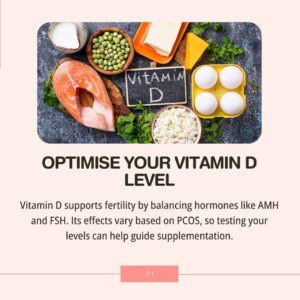How to Support Fertility When You Have Low AMH Level
Navigating your fertility journey with a low AMH (Anti-Müllerian Hormone) level can feel overwhelming, but there is hope.
While AMH reflects the quantity of your remaining eggs, it doesn’t determine egg quality or your ability to conceive.
With the proper nutrition and lifestyle changes, you can slow ovarian aging, protect egg quality, and improve your chances of a healthy pregnancy.
In this post, you’ll discover five science-backed nutrition strategies to support your fertility when dealing with low AMH.
What Is Low AMH and Why Des It Matter?
AMH is a hormone produced by small follicles in your ovaries. It’s a helpful marker for ovarian reserve—essentially, the number of eggs you have left.
A low AMH result typically suggests fewer remaining eggs, making conception more challenging. However, it’s essential to know that:
✅ You can still get pregnant with low AMH
✅ AMH doesn’t measure egg quality
✅ Nutrition and lifestyle can influence egg health and hormone balance
5 Nutrition Strategies to Improve Fertility with Low AMH
1. Optimise Your Vitamin D Level

Vitamin D plays a complex but essential role in fertility and ovarian function.
A 2020 systematic review found that vitamin D supplementation may affect AMH levels differently depending on whether or not a woman has PCOS:
- In women with PCOS, vitamin D lowered AMH, which may help improve ovulation.
- In ovulatory women without PCOS, vitamin D supplementation increased AMH—suggesting a potential benefit to ovarian reserve.
Previous studies also suggest that higher vitamin D is associated with lower FSH (Follicle Stimulating Hormone) level — a hormone that rises as ovarian reserve declines. This means vitamin D may help slow that decline and support hormonal balance.
💡 Tip: Ask your doctor for a vitamin D blood test and consider supplementing if your level is below optimal.
2. Follow a “Prudent” Whole-Food Diet

A 2024 study from Poland found that women who followed a prudent diet—rich in vegetables, fruits, whole grains, and lean proteins had significantly higher AMH levels and more antral follicles (a positive fertility marker) than those following a Western diet high in sugar and processed food.
💡 Tip: Think Mediterranean-style eating. Build your meals around whole, unprocessed foods for long-term fertility support.
3. Cut Back on Saturated Fats and Fast Foods

Multiple studies have shown that a high intake of saturated fats, fast foods, and processed snacks is linked with lower AMH level. These associations held firm even after adjusting for age, weight, and activity levels.
A separate 2024 study also found that a high intake of sucrose (added sugar) and erucic acid (found in certain oils) may negatively affect AMH levels.
💡 Tip: Replace fried and fast foods with nutrient-dense options like avocado, extra-virgin olive oil, fish, nuts, and legumes.
4. Maintain a Healthy Body Composition

A healthy waist-to-hip ratio (WHR) and balanced body fat may support better AMH levels. The 2024 study mentioned above found that lifestyle factors like WHR and specific nutrient intake significantly influenced AMH.
💡 Tip: Focus on sustainable movement and nourishing meals to reach a healthy body composition—not crash dieting or over-exercising.
5. Personalise Your Supplement Strategy

While there’s no “one-size-fits-all” supplement for low AMH, certain nutrients like vitamin D, omega-3s, folate, and CoQ10 are commonly used to support egg quality. However, it’s essential to personalise your supplement plan based on your test results, ovulatory status, and fertility goals.
💡 Tip: Work with a fertility dietitian to review your current supplements and fine-tune them to your needs.
Bottom Line
- Nutrition matters: Whole foods, fewer processed fats, and targeted nutrients may support ovarian reserve and low AMH level.
- Vitamin D can help: Especially when personalised to your hormone profile and ovulatory status.
- Lifestyle counts: Healthy weight, reduced inflammation, and hormone balance all influence fertility potential.
